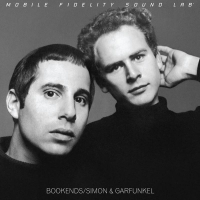Description:
- 180 gram LP !
- 1/4" / 15 ips analog copy to DSD 256 to analog console to lathe !
- Numbered edition limited to 4000 copies !
- Pressed at Fidelity Record Pressing on MoFi SuperVinyl !
- Stoughton Printing gatefold jacket !
- Hear the brilliance of the original recording sessions! Simon & Garfunkel's Bookends includes the hits "Mrs. Robinson" and "A Hazy Shade of Winter" !
Concept album, career-making moment, industry-defying creation, years-long pursuit of perfection: Simon and Garfunkel's Bookends adheres to all those descriptions and more, the record at once a defining statement of the late 1960s and salient reflection on relationships, identity, society, and mortality whose enduring relevance attests to its exceptional merit. Ranked by countless sources as one of the greatest records of all time, the 1968 work transcends styles, trends, and generations.
Mastered on MoFi's renowned system at the label's California studio, housed in a Stoughton jacket, pressed at Fidelity Record Pressing, and strictly limited to 4000 numbered copies, Mobile Fidelity's 180 gram SuperVinyl 33 1/3 RPM LP of Bookends presents the duo's timeless effort in reference-quality sound. Benefitting from the inherent properties of the SuperVinyl formula a nearly inaudible noise floor, superb groove definition, dead-quiet surfaces this collectible reissue magnifies the brilliance of the extended production sessions that took place over the course of 18 months at Columbia's iconic 52nd Street Studio.
Simon himself said that Bookends possesses "the most use of the studio" of any Simon & Garfunkel effort. The plain truth of his observation comes to fore on this audiophile LP. The full bloom and natural decay of notes; weight and impact of low-end frequencies; lushness, breathiness, and air of the omnipresent harmonies; separation and imaging of the wood, string, and brass instruments; timbres and in-the-room realism of Simon's lead vocals these critical traits and more are rendered with elevated accuracy, detail, and presence. Bookends has never sounded more transparent, lifelike, or balanced.
And that's exactly what Simon, Garfunkel, and producer Roy Halee intended while taking as many as 50 hours to nail a single track. Envisioned from the start by Simon as a way to capture the age's zeitgeist, and inspired by the broad strokes of the Beatles' Sgt. Pepper's Lonely Hearts Club Band and Bob Dylan's Blonde on Blonde, Bookends pairs its sonic flair and diverse arrangements that incorporate folk, rock, jazz, pop, and baroque elements with arresting lyrics that address restlessness, uncertainty, alienation, love, and heritage.
The first half of Bookends traces the cycle of life from beginning to end, with the final words to "Bookends Theme" a call to "preserve your memories/they're all that's left you" echoing as the overarching and recurring theme of the album. Before the pair lands on that advice, Simon & Garfunkel use irony ("Save the Life of My Child"), metaphor ("America"), suggestion ("Overs"), field recordings ("Voices of Old People"), and descriptive imagery ("Old Friends") to cover everything from the loss of innocence to institutional hypocrisy and fears of loneliness.
Released amid a tumultuous political and cultural climate, Bookends retains enormous significance and relevance more than five decades later in a 21st century facing many of the same issues. Its central motifs searching for meaning and identity; dealing with loss and disappointment; negotiating the split between authenticity and ersatz; reconciling with what one sacrifices over a lifetime; confronting life stages that involve sadness, bewilderment, and disappointment are universal concerns. And the "America" Simon & Garfunkel pursues remains more elusive than ever.
As does our collective want for a lasting hero ("Mrs. Robinson"), tendency toward affectation ("Fakin' It"), and inclination to wishfully insert ourselves into circumstances rooted in whimsical fantasy ("Punky's Dilemma"), particularly when we need an escape. Though the songs on the album's second half were not devised as part of a unified narrative, they speak a related language steeped in disillusionment, anxiety, and doubt. None more so than on the grayscale "A Hazy Shade of Winter."
"Simply pretend", Simon sings, "that you can build [hopes] again", knowing full well he's not even fooling himself. Like few albums before or since, Bookends exposes the human condition from the inside-out amid an environment that isn't what it often appears or what we originally sought. [Masquer]







